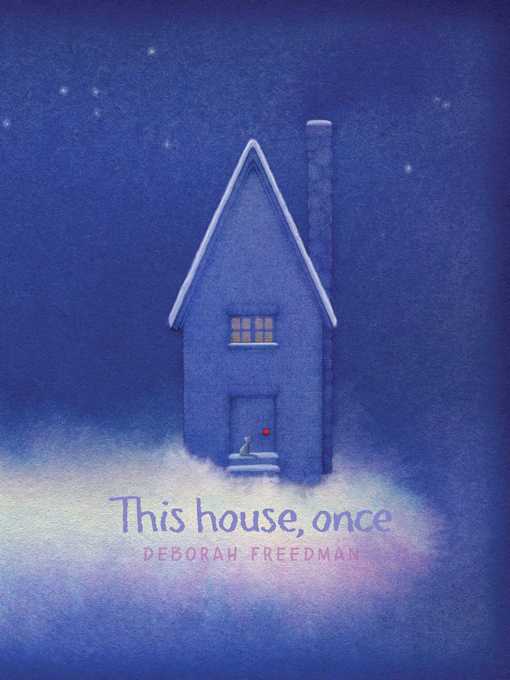
This House, Once
فرمت کتاب
ebook
تاریخ انتشار
2017
Lexile Score
400
Reading Level
0-2
ATOS
3
Interest Level
K-3(LG)
نویسنده
Deborah Freedmanشابک
9781481442855
کتاب های مرتبط
- اطلاعات
- نقد و بررسی
- دیدگاه کاربران
نقد و بررسی

Starred review from November 21, 2016
Freedman (Shy) lyrically meditates on the origins of a house. “This door was once a colossal oak tree about three hugs around and as high as the blue,” she writes, opposite a spare, clean drawing of a door against a white backdrop. A page turn reveals the giant oak, the door traced within its trunk to show where it used to be. The stones that make the house’s foundation “were once below, underground, deep asleep,” and readers see a cross-section of the ground the stones were dug from. While the house takes shape, a kitten, frog, and yellow bird play as the leaves fall; fog overtakes them, and gray wash and muted textures herald the arrival of winter. The door opens, and readers join the kitten indoors: “Lights, doorknob, bookshelf, under-the-stair... What were these all, once?” Freedman’s gentle inquiry is drawn with exquisite precision and quiet dashes of humor, and it will leave children thinking about the way their own houses are an extension of the natural world, with “memories” of the resources used to bring them into existence. Ages 4–8. Agent: Stephen Barr, Writers House.

Starred review from December 1, 2016
Softly, poetically, an unseen narrator explores a house and what it is made of.A small wooden door with a red doorknob sits in the middle of white space. "This door was once a colossal oak tree / about three hugs around / and as high as the blue." Next, on a full-bleed double-page spread, the door appears as part of its original oak, which sits in purple grasses, reaching through clouds to the sky. Bricks--made from mud--appear around the door, and the next spread takes readers to a large, tempting mud puddle, a turtle happily a-wallow, a frog at play, a kitten dipping paws in. "This roof was once rock, / carved and cleft // and shingled to shelter // from gray wet"--a humble, elegant sheet of slates hovers above the in-process house (which still sits in white space), and on the following spread, downy mists of pale indigo-pink highlight the small turtle, frog, kitten, and bird outdoors in the "gray wet." Using pencil (both gray and colored), watercolor, and pastel--all with a supreme delicacy--Freedman builds this house until, behind swirls and flurries of an opaque snowstorm, a light-skinned child inside the house welcomes the kitten in. The arc emphasizes shelter but also human use of nature, so the feelings of warmth, safety, and coziness hold the faintest tinge of melancholy and loss. Tender, comforting, and complex. (author's note) (Picture book. 3-8)
COPYRIGHT(2016) Kirkus Reviews, ALL RIGHTS RESERVED.

Starred review from January 1, 2017
PreS-Gr 2-In a story that's more poetic than technical, select pieces of a home are highlighted to emphasize the idea that a house remembers. A domicile is constructed with natural elements that began as something much different. "This door was once a colossal oak tree about three hugs around and as high as the blue." The images start simply, with mostly white space and three or four lines of prose. The next spread illustrates the previous page's text with softly muted blues, purples, and oranges and lightly placed lines. This pattern continues until the middle of the book, where the visuals and text combine. The pages become more crowded and rich with color, proclaiming that a house remembers and bringing the tale full circle with the conclusive phrase, "which once was an oak." If readers look closely, they will also notice a cute kitten and/or a bright contrasting red doorknob in most of the illustrations and a change in seasons. Freedman has created a cozy offering to share that will spark curiosity. Conversations centered on questions such as, "How was our house made?," "Where did the various materials come from?," and "What function does it serve?" between a caregiver and child will carry on the ideas presented in this title long after it has been set down. VERDICT A lovely, ruminative selection, best shared one-on-one or in a small group setting.-Mindy Hiatt, Salt Lake County Library Services
Copyright 2017 School Library Journal, LLC Used with permission.

November 15, 2016
Preschool-G Combining lyrical language and cozy mixed-media artwork, Freedman celebrates the elements of the natural world (oak, stones, mud, rocks, and sand) used in the construction of a house. Spreads alternate between simple drawings of isolated house parts ( This door was once a colossal oak tree about three hugs around and as high as the blue ) and full-page spreads depicting the object in its original natural setting. Structural features are added as the story progresses: a stone foundation appears under the oak door, followed by mud brick walls, a slate roof, and finally glass windows. When the house is completed, listeners are treated to welcoming interior views that include a roaring fire, a child reading under the stairs, and a playful kitten who has also appeared in many of the earlier spreads. An author's note invites readers to consider the building materials used in their own houses. Dreamy and imaginative, this makes a good read-aloud, especially paired with Jonathon Bean's Building Our House (2013).(Reprinted with permission of Booklist, copyright 2016, American Library Association.)

























دیدگاه کاربران